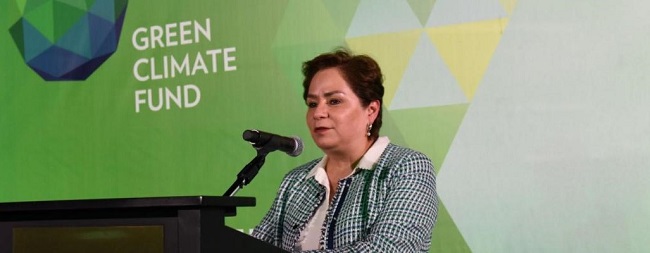In the light of the Green Climate Fund (GCF) meeting in Bahrain from October 17 to 20, 2018, Executive Secretary of UN Climate Change, Patricia Espinosa, has stressed the importance of a successful outcome of the meeting and the impact it will have on the UN Climate Change Conference (COP24) holding in December in Katowice, Poland. In an address, Ms. Espinosa highlighted the role that the GCF plays in supporting the shift of developing countries to low-emission and climate-resilient pathways.

The GCF is close to my heart – I was the COP President when it was established at COP16 in Cancun. Much has changed since then: both in the climate change process and throughout the world.
While many accomplishments have moved us forward, such as the signing of the Paris Agreement, the stark reality is that today we’re in a race against time and we’re falling behind.
The recent Special Report from the IPCC emphasizes just how little time remains to limit global temperature rise to 1.5C.
Never have we faced the urgency we do now. Never has the need for solutions been greater. Never has there been more need for multilateral cooperation. And never has finance played a more central role to the overall climate regime itself.
With that urgency as a backdrop, and with the climate regime entering one of its most crucial and defining periods, expectations for the GCF and this meeting are very high.
At COP24 in December, Parties must achieve one clear goal: finalising the Paris Agreement Work Programme.
This is more than a set of rules, it will unleash the power of the Agreement itself.
The outcome of this session of the GCF will impact those negotiations in Katowice.
Success here means sending a clear and unmistakable message of trust to developing countries that they can have confidence in the process going forward.
Replenishing the GCF will allow it to continue playing a critical role in supporting developing countries shift to a low-emission and climate-resilient path.
We recognise that the GCF is a very young institution that has made progress since its inception. We congratulate you on this work as you continue building a stronger and more vibrant institution over the long-term.
At the same time, the GCF, like any other new institution, continues to evolve.
In addition to the launching of the replenishment process, we see three other challenges facing the GCF going forward.
The first challenge is addressing existing policy gaps.
While other gaps exist, one is the lack of a regulatory framework allowing for a proper assessment of projects.
This is an important policy gap – particularly now that the number of projects in the pipeline far exceeds available financial resources.
This must be addressed for the GCF to prioritize projects for funding.
The second challenge is the implementation of GCF projects that have already been approved.
Although the number of projects that have their Funded Activity Agreements signed has increased over the past two years, the number is still too low.
As of April 2018, only 26 projects out of the 76 approved have started implementation and $158 million has been disbursed.
This represents only 13 per cent of total value of the projects under implementation and only 4 per cent of total GCF funding.
The delay in the signing of Funded Activity Agreements for approved projects is slowing down the implementation of projects.
Finally, going forward, the GCF must learn from its experience and anticipate future requirements by assessing:
- whether its policies have resulted in the desired outcomes;
- and to what extent they are aligned with the scale and pace required for a successful implementation of the Paris Agreement.
These are immediate and significant issues, but the benefits of addressing them are clear.
They will help deliver the much-needed climate financing support for developing countries, particularly the most vulnerable.
And as I said before, they’ll allow the GCF to continue playing a critical role in supporting developing countries shift to low-emission and climate-resilient development paths.
Looking deeper, because climate change is connected to some of humanity’s biggest challenges, proper financing can also help tackle issues such as poverty, migration, equality and more – issues reflected in the Sustainable Development Goals.
Not achieving these goals – addressing climate change is Goal 13 on that list – could lead to great destabilisation throughout the world. If we think it’s bad now, a business-as-usual approach will make things much, much worse.
And let’s remember: when it comes to climate change, finance is about more than money.
It’s about helping people impacted by climate change. It’s about reducing their suffering. And, in some cases, it’s about saving lives.
We face an unprecedented level of urgency to address climate change. I cannot stress this enough. The Special Report by the IPCC made this very clear.
The time has come to put aside differences where they exist and work together to achieve our common climate goals.
Climate change recognises no boundaries – political or otherwise – it is coming all the same. Our approach must be one of unity.
Let us therefore embrace our challenges. Let us exceed expectations. Let us build the trust that is needed. And let these meetings provide the results.
